Port of Felixstowe: What do strikes at UK's biggest container port mean?
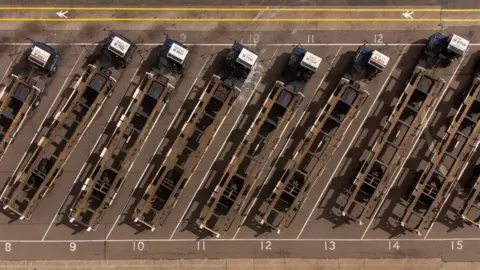 PA Media
PA MediaWorkers at Felixstowe, the UK's busiest container port, have returned to work after an eight-day strike. But what impact did the industrial action have on shipping in and out of the terminal?

'Congestion'
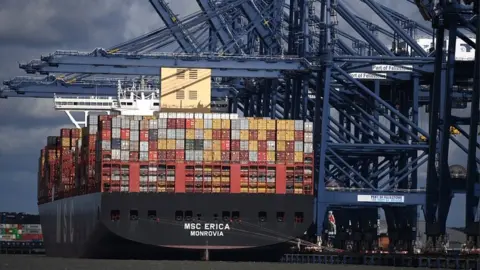 EPA
EPAThe Port of Felixstowe in Suffolk is a vast operation and handles almost half of the UK's container trade.
For the past eight days, hundreds of workers, who are members of the union Unite, were on strike.
The BBC asked the Port of Felixstowe what impact this action had on shipping and UK supply chains, but the port declined to comment on the record.
Instead, the BBC turned to available shipping data to see if it could shed some light.
MarineTraffic is a global maritime analytics provider.
Alex Charvalias, the company's supply chain in-transit visibility lead, said: "While the Felixstowe port is still trying to handle the congestion caused by the [previous] strike in August, it is now feeling the impact of the latest strike."
One of the key measures used in shipping is the TEU, which is stands for twenty-foot equivalent units - the size of a standard shipping container.
He pointed to a big increase in the number of containers on ships waiting to come into port, compared to the pre-strike volume earlier in the summer.
"On 30 September, the total TEU capacity waiting 'off port limits' [just outside a port] for container ships has been the highest observed in recent months, reaching more than 65,500 TEUs," said Mr Charvalias.
Between June and July, the capacity of containerships waiting off port limits was between 20,000 and 30,000 TEUs.
"The disruptions of this strike... and the new one planned from 11 to 17 October in the port of Liverpool, will unquestionably aggravate even more the congestion."

'Weight and waits'
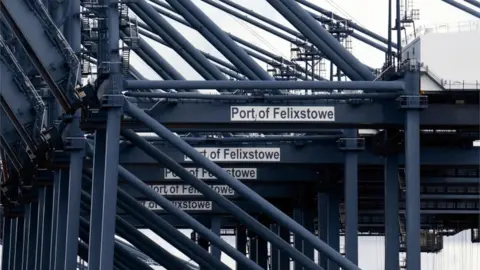 PA Media
PA MediaHow long are container ships having to wait in port?
MarineTraffic said the full data for the current week was not yet available.
However, during the previous eight-day strike in August, container ship in-port waits rose from between one and two days to eight days.
Do longer waits in port matter?
Possibly not, according to one person the BBC spoke to with knowledge of the port's operations.
The BBC was told that because of the wider slowdown in the UK economy, retailers were not currently as dependent on getting new stock in as they had previously been.
The source said logistics managers, in the wake of the global pandemic, factored in "expected disruption" to their operations.

The port
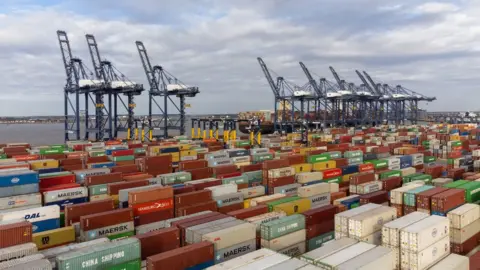 PA Media
PA MediaFounded as The Felixstowe Railway and Pier Company in 1875, the port has main two terminals running along the north bank of the Harwich Harbour estuary - Landguard and Trinity - and a roll on/roll off facility.
Trinity has seven deep-water berths, one of Europe's longest continuous quays measuring 2.5 km (1.5 miles), 17 ship-to-shore gantry cranes, 48 rubber-tyred gantry cranes, 10 high-stacking container handlers and four top loading reach-stackers.
Berths eight and nine were built at the Landguard Terminal to accommodate the world's largest container ship, the Olympic class MSC Oscar, which can carry 19,224 TEU containers.

Where do ships go?
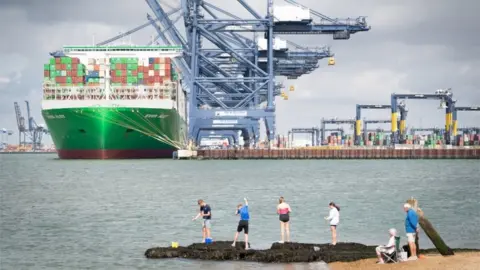 PA Media
PA MediaEach year, Felixstowe sees in about 2,000 ships, handles four million TEUs and hosts 17 different shipping lines.
But what do shipping companies do when there is industrial action at a port?
One industry insider told the BBC: "The ships that call at Felixstowe will call at other ports as well on the way.
"So, if there is industrial action in Felixstowe, they might unload the Felixstowe cargo at another port and then reload on to the next ship.
"Shipping lines tend to prefer to delay a shipment than divert it."

The dispute
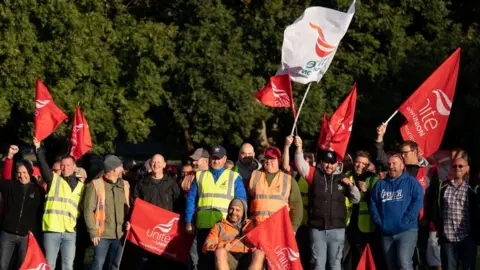 PA Media
PA MediaPay is at the heart of the dispute between the port's Chinese owners Hutchison and the union Unite, which represents about 1,900 of the port's 2,500 or so workers.
The port has offered an increase of 7% plus £500 backdated to 1 January 2022.
Unite claims with inflation currently running at about 10%, the offer is effectively a pay cut.
At the start of September, the port said negotiations had broken down and it would introduce its pay award without union agreement.
The latest eight-day strike, which ended at 06:59 BST on Wednesday, followed another eight days of industrial action in August.
Unite said although further industrial action had not yet been called for at Felixstowe, it was "likely" unless the port changed its current position regarding the pay offer.

Find BBC News: East of England on Facebook, Instagram and Twitter. If you have a story suggestion email [email protected]
